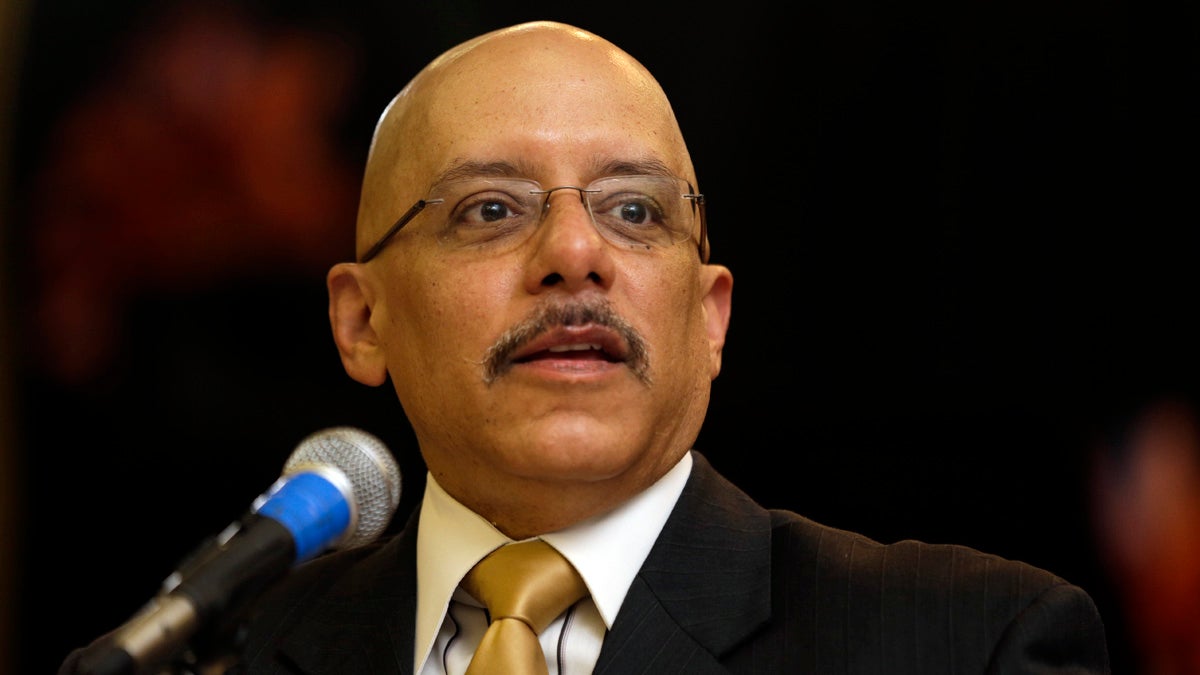Top Pa. lawmaker says added rigor of state tests calls for spending increase

State Sen. Vincent Hughes of Philadelphia said poor results on recent tests make a clear argument for lawmakers to adopt Gov. Tom Wolf's proposal to increase state education funding. (Matt Rourke/AP Photo)
A top Pennsylvania Democrat is calling for substantial new investment in education in light of more rigorous state standardized tests.
State Sen. Vincent Hughes of Philadelphia said poor results on recent tests make a clear argument for lawmakers to adopt Gov. Tom Wolf’s proposal to increase state education funding
The 2014-15 school year was the first in which the Pennsylvania System of School Assessment tests – taken in grades three through eight – were aligned with Pennsylvania’s version of the Common Core state standards.
Based on the added difficulty of the tests and the state’s higher expectations for performance, proficiency rates dropped on average by 35.4 percentage points in math and 9.4 percentage points in English language arts.
In some schools, math proficiency rates dropped by more than 40 percentage points.
Officials from the Pennsylvania Department of Education say it is misleading to compare student proficiency rates to prior years; 2014-15 should be considered the “new baseline,” the department said.
The sharp declines in scores have been making waves across the state, as educators and parents grapple with how to adjust to the higher expectations.
“High standards are appropriate, but the thing that’s the crime in this is not having the resources available to meet those standards,” said Hughes.
Hughes, the minority chair of the Senate Appropriations Committee, specifically called on his colleagues to agree to Wolf’s proposal for an increased tax on natural gas drilling.
Hughes said he hasn’t taken a head count within the Democratic caucus of support for Wolf’s pitch for a tax increase in sales and personal income.
Wolf seeks these taxes, along with an increased state cigarette tax, in concert with a local property tax reduction to infuse public schools with an additional $500 million in basic and special education funding.
GOP reactions
Republican leaders in the House rejected Hughes’ rationale. They believe that PSSA scores will rise as schools recalibrate their curriculum to the newer standards.
They doubt whether Wolf’s proposed funding increase would be effective.
“Money itself is not going to bring up test scores,” said Steve Miskin, spokesman for Speaker of the House Mike Turzai, R-Allegheny, and House majority leader Dave Reed, R- Indiana. “Is that going to raise everybody’s PSSA scores? No.”
Miskin viewed Hughes’ perspective as unique to the state’s largest city.
“It’s funny. That’s really a question almost only in Philadelphia. Everywhere else, they go to their school boards,” said Miskin. “Philadelphia is the only one that says to Harrisburg, ‘What are you doing for me?'”
Philadelphia has been under the purview of the majority-state-appointed School Reform Commission since 2001.
Lawmakers have been entrenched in a battle over Wolf’s proposed budget for months. Republican lawmakers passed a budget before the state’s June 30 deadline that did not include any of Wolf’s priorities.
Wolf swiftly vetoed that plan and negotiations have been fruitless in the weeks since.
Last week, Wolf pledged he would not budge from his proposal to increase basic education spending by $400 million.
If the Legislature falls short of Wolf’s education spending proposal, Hughes said lawmakers should reconsider the rigor of the tests.
“If we don’t have the resources in place, then we may need to re-evaluate the standards,” he said.
The Wolf administration said it has been working on an academic accountability plan that puts less of an emphasis on standardized testing, but details have yet to be finalized.
WHYY is your source for fact-based, in-depth journalism and information. As a nonprofit organization, we rely on financial support from readers like you. Please give today.





